Half-a-century since Stormont was replaced by direct rule
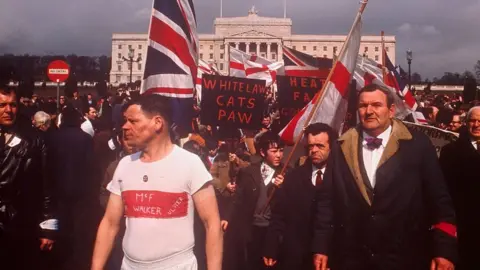 Getty Images
Getty ImagesThe unionist-controlled Stormont parliament which used to govern Northern Ireland was closed down exactly 50 years ago.
The Parliament of Northern Ireland met for the final time on 28 March 1972, amid mass unionist and loyalist protests about the end of devolution and the introduction of direct rule from Westminster.
With violence escalating since the outbreak of the Troubles in the late 1960s, the Conservative government felt it needed to intervene.
As Stormont was about to be prorogued, the Ulster Unionist leader, Brian Faulkner, addressed a crowd of up to 100,000 people from the first-floor balcony of Parliament Buildings.
He told them: "We feel that we, in our endeavours to provide just government in Ulster, have been betrayed from London."
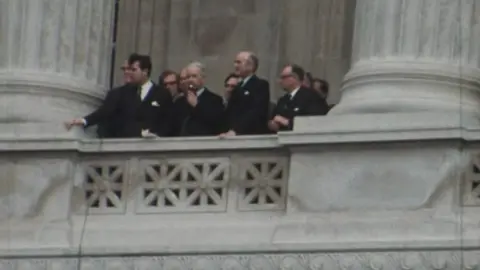
Politics in Northern Ireland was never the same again.
It marked the end of the majority-rule parliament which had been in place since 1921 when Northern Ireland was first established.
Full responsibility
The UK Prime Minister Edward Heath defended the introduction of direct rule in a special broadcast from Downing Street.
He said: "The government have concluded after long and anxious thought that we must make possible a completely fresh start.
"It is needed if we are to break out of the vicious circle of violence and yet more violence.
"The government here in London is therefore obliged for the time being to take over full responsibility for the conduct of affairs in Northern Ireland."
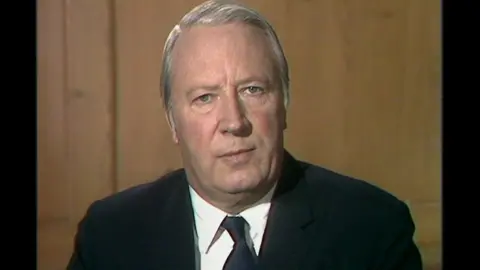
The security policy of internment without trial, introduced the previous year, had caused huge resentment within the nationalist community, as had Bloody Sunday when 13 people were shot dead when soldiers opened fire at a civil rights demonstration in Londonderry in January 1972.
By March, the Conservative government had decided it needed to take action.
It hoped a different approach might lead to an IRA ceasefire.
Heath told the Stormont administration it could continue to exist but London now needed to take charge of law and order to try to stop the violence on all sides.
Unionists led by Faulkner, who was the prime minister of Northern Ireland, resisted London's request.
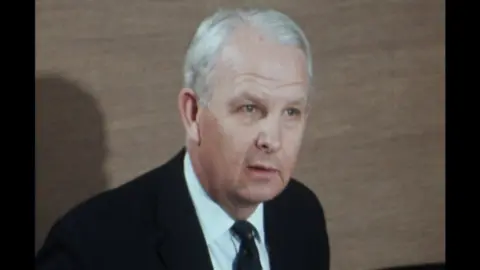
When it became clear that Heath was determined to go ahead, Stormont ministers resigned and the Northern Ireland parliament was prorogued.
The BBC journalist reporting from Stormont at the time, Don Anderson, said the move came as a surprise.
Looking back, he said: "It was an absolute shock. 1972 was one of the worst years of the Troubles, with the number of deaths, killings, maimings and bombings.
"You would have thought that because of this, and the political rumblings, we would have expected it, but that actually wasn't the case.
"And when it happened, that this devolved government that had been in situ for half a century, when it suddenly was very, very quickly taken away, you realised that a threshold had been crossed."
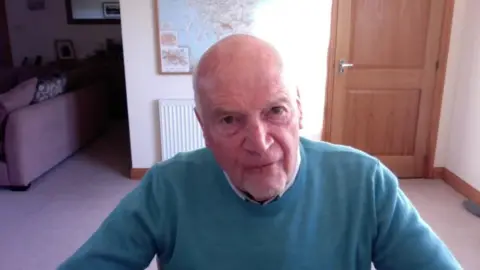
At the time, there were hopes that the violence would soon stop, but it continued. More than 400 people were killed in 1972.
With Stormont prorogued, the Northern Ireland Office was set up its first secretary of state was Conservative MP William Whitelaw.
Direct rule was supposed to be a temporary measure but it ended up being in place for most of the next 30 years.
A devolved power-sharing executive was put in charge at the start of 1974 but it was brought down by loyalist protests within a matter of months.
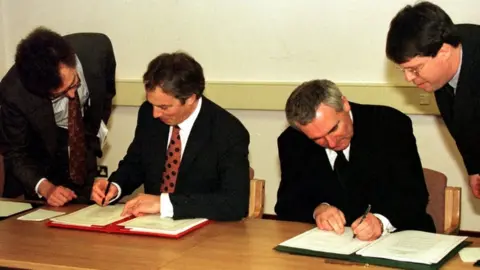
It was not until the Good Friday Agreement in 1998 that new arrangements were put in place for a new devolved executive and the Northern Ireland Assembly.
Unlike the Stormont parliament, it cannot be controlled by one party. Power-sharing is mandatory.
The current assembly has just been dissolved ahead of the 5 May election.
By coincidence, the dissolution came into effect on 28 March, the same date that the old Stormont parliament was shut down 50 years ago.
